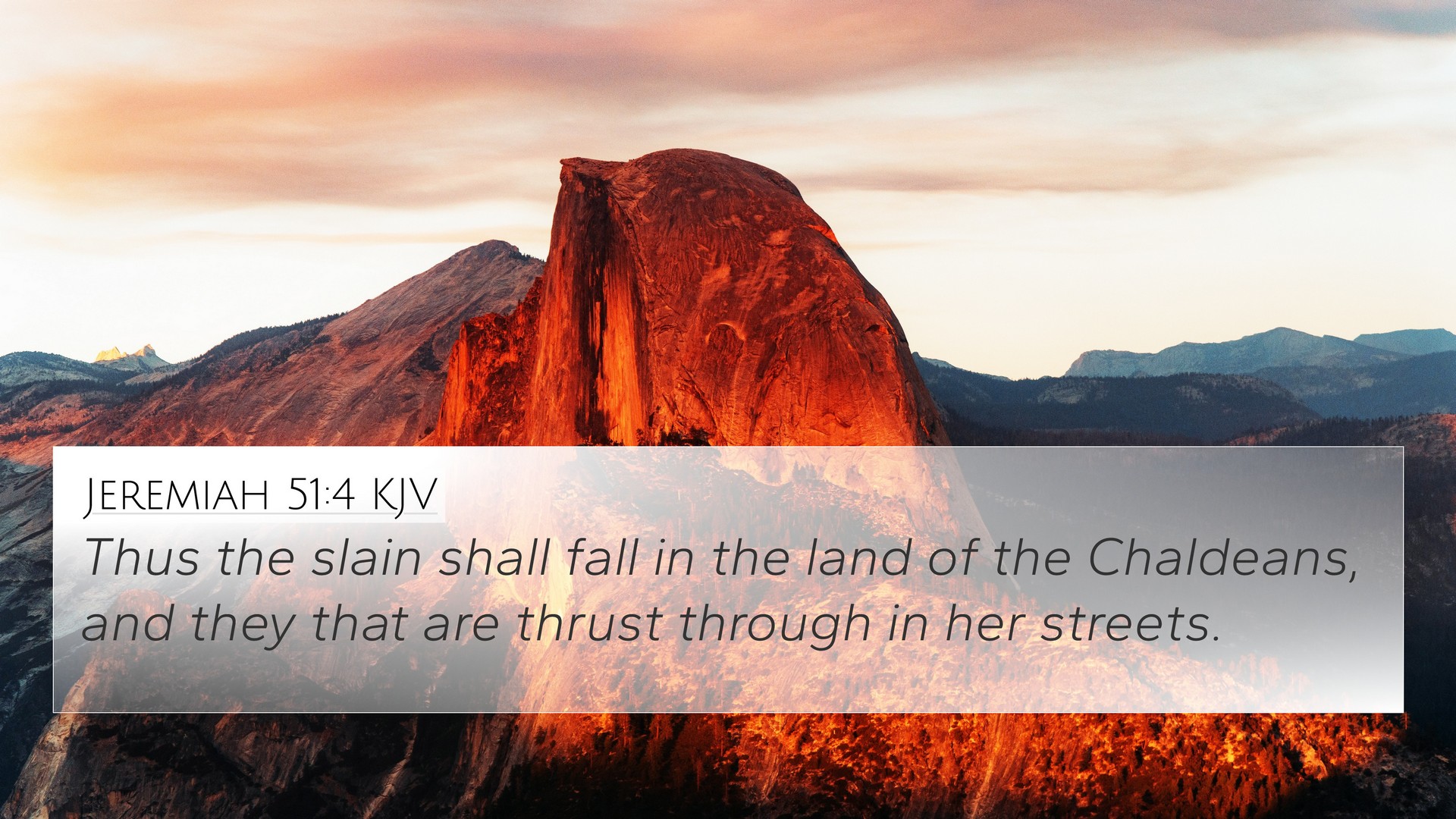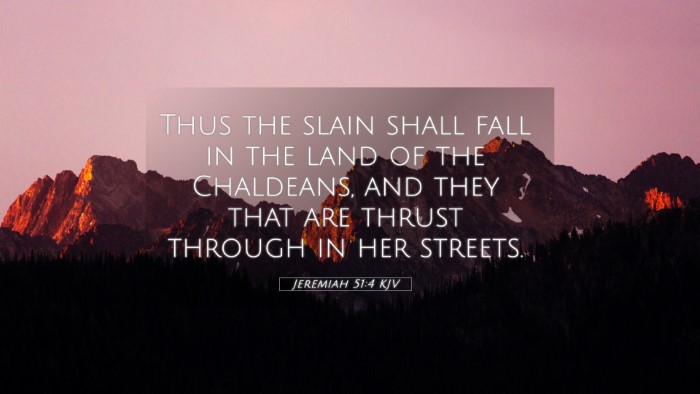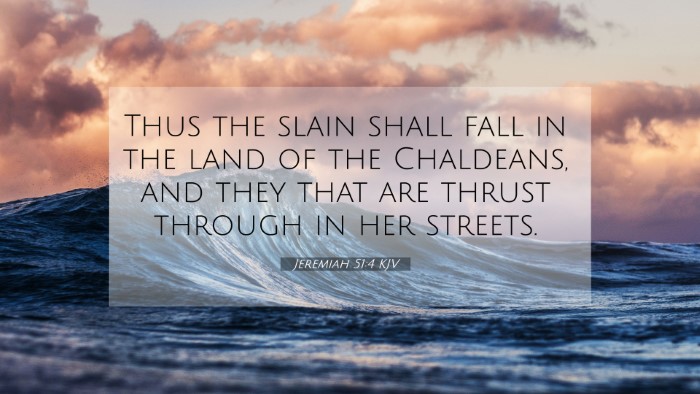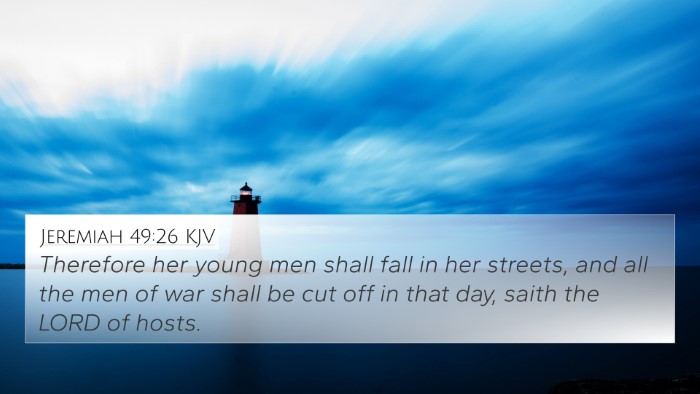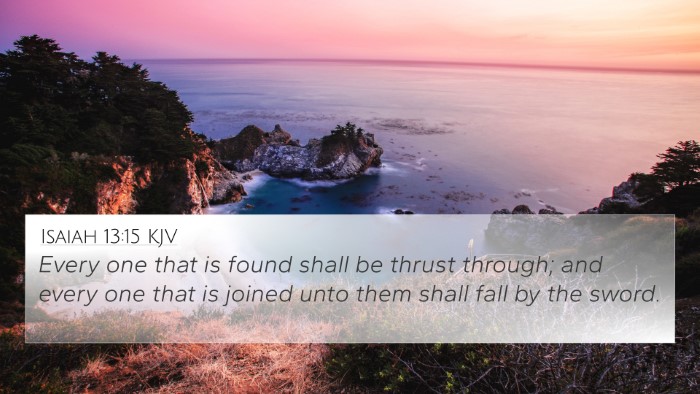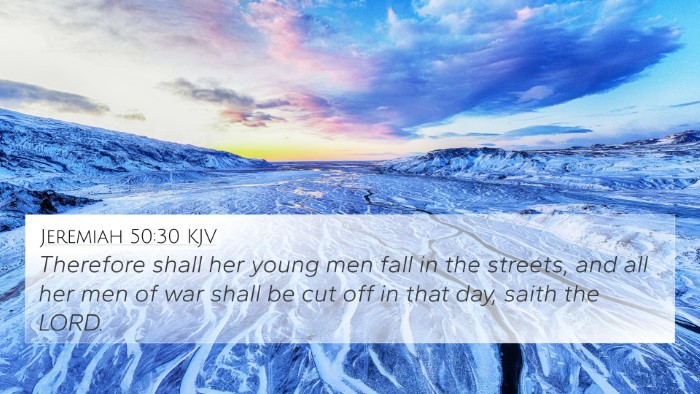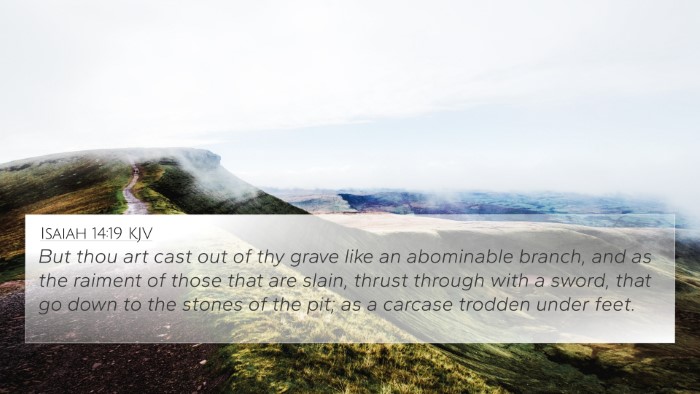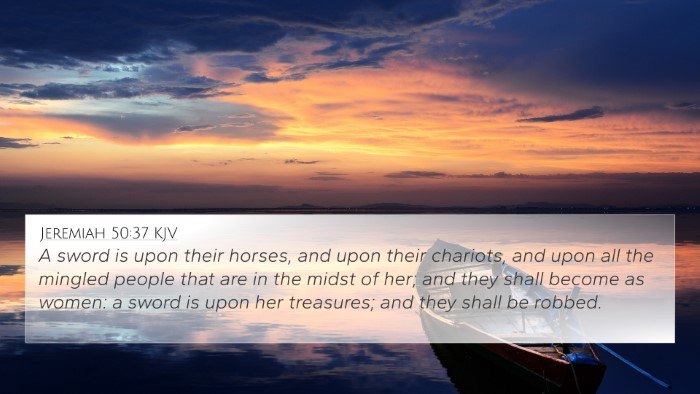Understanding Jeremiah 51:4
Verse: "And thus shall Babylon sink, and never rise up from the evil which I will bring upon her: and they shall be weary." (Jeremiah 51:4)
Summary of Meaning
This verse from Jeremiah declares the total destruction of Babylon, highlighting that the city will not recover from the calamities that God will bring upon it. It emphasizes God's judgment against Babylon's wickedness and the certainty of divine punishment.
Insight from Public Domain Commentaries
Matthew Henry's Commentary
Henry comments on how the fall of Babylon symbolizes the triumph of good over evil, indicating that God’s decree leads to Babylon's inevitable demise. He emphasizes that Babylon’s destruction serves as a warning to all nations, illustrating the consequences of idolatry and sin.
Albert Barnes' Notes on the Bible
Barnes elaborates that the judgment against Babylon is a direct response to her pride and opposition to God's people. He notes that Babylon, once a powerful empire, will face divine retribution and will be reduced to a state of abandonment, never to rise again. Barnes also associates this prophecy with the themes of divine justice and the accountability of nations.
Adam Clarke's Commentary
Clarke discusses the metaphorical use of 'sinking' to describe Babylon’s downfall. He asserts that this represents not just physical destruction but also a spiritual defeat. Babylon symbolized oppression and tyranny; thus, its fate serves as a prolonged encouragement for oppressed people who seek justice from God.
Bible Verse Cross-References
To enhance understanding of Jeremiah 51:4, we can explore several related verses:
- Isaiah 13:19 - "And Babylon, the glory of kingdoms, the beauty of the Chaldeans’ pride, will be as when God overthrew Sodom and Gomorrah." This verse parallels the theme of inevitable judgment and destruction.
- Revelation 18:2 - "And he cried mightily with a loud voice, saying, 'Babylon the great is fallen, is fallen, and has become a dwelling place of demons, a prison for every foul spirit.'" This eschatological reference connects to the prophecy of Jeremiah, showing the enduring significance of Babylon's fall.
- Jeremiah 50:30 - "Therefore, shall her young men fall in the streets, and all her men of war shall be cut off in that day," further emphasizes the devastation that will come upon Babylon.
- Isaiah 45:1 - "Thus says the LORD to His anointed, to Cyrus, whose right hand I have held—To subdue nations before him…" indicates God's use of Cyrus to execute divine judgment against Babylon.
- Revelation 14:8 - "And another angel followed, saying, 'Babylon is fallen, is fallen, that great city, because she has made all nations drink of the wine of the wrath of her fornication.'" This verse reflects the judgment narrative that began in Jeremiah.
- Ezekiel 26:21 - "I will make you a desolate city, like the cities that are not inhabited. I will bring the deep upon you, and great waters will cover you," which reinforces the concept of desolation associated with divine wrath.
- Jeremiah 51:5 - "For Israel is not forsaken, nor Judah, by his God, the LORD of hosts; though their land was filled with sin against the Holy One of Israel." This verse reassures that God’s chosen people are protected even amidst judgment on Babylon.
Connections Between Bible Verses
The destruction of Babylon serves as a critical theme throughout the Bible, providing a canvas for understanding God’s nature, His justice, and His plans for humanity.
Linking Bible Scriptures
Cross-referencing these scriptures shows the repeated acknowledgment of Babylon's downfall across both the Old and New Testaments. This serves as a thematic connection between the prophetic warnings and their fulfillment in the apocalyptic literature.
Comparative Bible Verse Analysis
In studying these connections, it becomes clear that the theme of divine retribution extends beyond Babylon to encompass all nations that oppose God, emphasizing a universal principle of justice. By doing a comparative study, believers can see how God’s attributes are consistently portrayed through the narratives found in different books of the Bible.
Bible Reference Resources
Utilizing tools for Bible cross-referencing such as a Bible concordance or a cross-reference guide can aid in exploring these connections more deeply. This practice enriches the study, allowing individuals to understand the continuity of God’s message through various accounts.
Conclusion
Jeremiah 51:4 serves as both a warning and a promise of deliverance. In understanding this verse and its related scriptures, one gains insight into God’s faithfulness to His people and His sovereignty over the nations. Engaging with the text through cross-referencing offers a fuller understanding of its implications for both historical and contemporary audiences.
